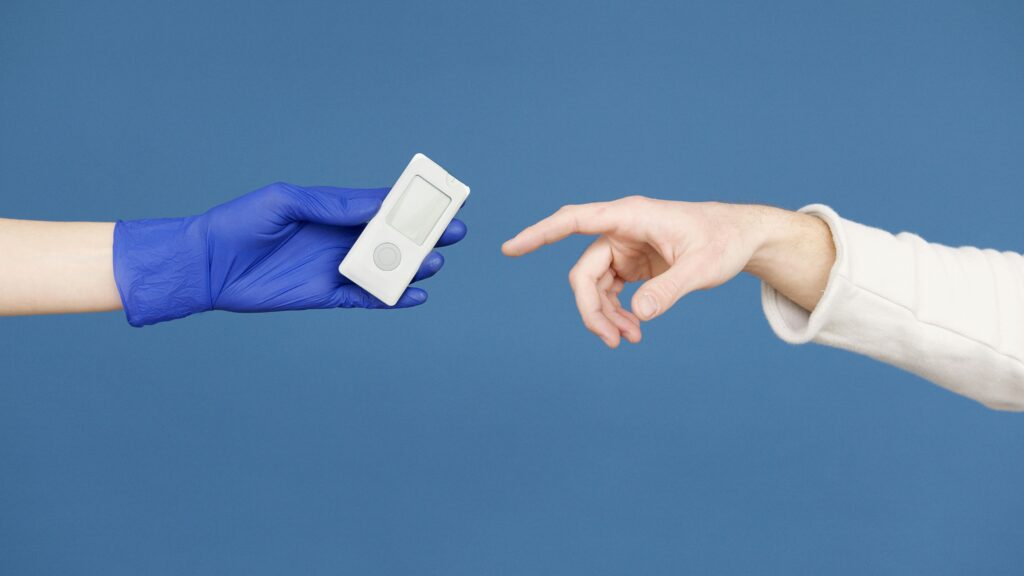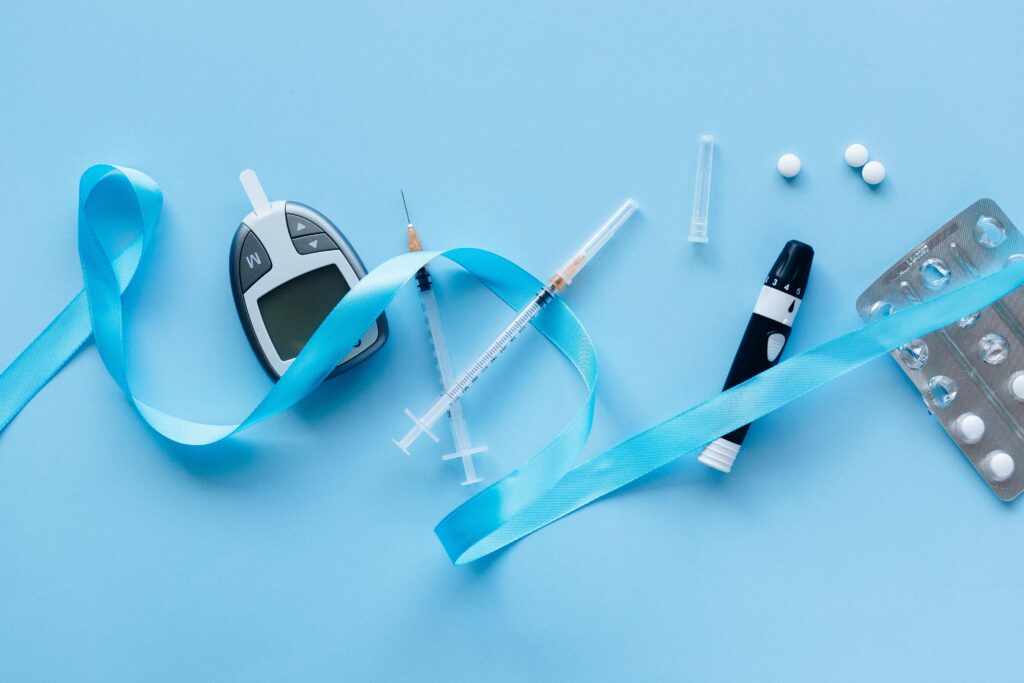Living with Type 1 diabetes can be a challenging journey, but with the right support and guidance from a trusted primary care doctor in North Haven, CT, managing this condition becomes more manageable. Type 1 diabetes, often diagnosed in childhood or early adulthood, requires diligent care to maintain healthy blood sugar levels and overall well-being. Here’s a closer look at the crucial ways a care doctor can assist individuals with Type 1 diabetes in North Haven, CT:

1. Blood Sugar Monitoring
One of the fundamental aspects of managing Type 1 diabetes is regular blood sugar monitoring. A primary care doctor in North Haven, CT, is pivotal in guiding patients on the proper monitoring techniques and frequency. This may involve teaching patients how to use glucose meters or continuous glucose monitoring systems. By tracking blood sugar levels consistently, individuals with Type 1 diabetes can make informed decisions about insulin dosage and lifestyle choices.
Here’s how a primary care doctor in North Haven, CT, tracks a patient’s blood glucose levels:
✔️ Glucometers
Glucometers are essential tools in managing Type 1 diabetes, and a primary care doctor in North Haven, CT, plays a pivotal role in educating patients on their effective use. These handheld devices enable patients to monitor their blood sugar levels easily. Typically, patients prick their fingers with a lancet to obtain a small blood sample, which is then placed on a test strip inserted into the glucometer. The device rapidly reads the glucose level in the blood and displays the result within seconds.
A primary care doctor guides patients in understanding when and how often to check their blood sugar levels. This typically involves monitoring before and after meals, as well as at bedtime. By teaching how to use glucometers effectively, they empower patients to make informed decisions about insulin dosage adjustments and lifestyle choices.
✔️ Continuous Glucose Monitoring (CGM) Systems
CGM systems significantly advance blood sugar monitoring for Type 1 diabetes patients. These systems provide real-time data on blood sugar levels, offering a more comprehensive view of glucose fluctuations throughout the day and night. A tiny sensor is inserted under the skin, typically on the abdomen, to measure glucose levels in the interstitial fluid continuously. The data is transmitted wirelessly to a device or smartphone app, allowing both a patient and their primary care doctor in North Haven, CT, to monitor trends and patterns. This real-time information is invaluable for making timely insulin dosage and lifestyle adjustments. A trusted primary care doctor guides patients in selecting and using CGM systems, ensuring they receive the most accurate and beneficial data for managing their diabetes.
✔️ Hemoglobin A1c (HbA1c) Test
The HbA1c test is a critical tool for assessing long-term blood sugar control in Type 1 diabetes patients. This blood test measures the average blood glucose level over the past two to three months and is conducted at regular intervals, typically every three months. A trusted primary care doctor in North Haven, CT, orders this test to evaluate how well a patient’s diabetes management plan is working. Lower HbA1c levels indicate better blood sugar control, while higher levels may signal the need for adjustments to the treatment plan for diabetes. The HbA1c test provides a comprehensive overview of a patient’s diabetes management, helping the primary care doctor make informed decisions and recommendations for optimizing their care.
✔️ In-Office Monitoring
During routine office visits, a primary care doctor may perform point-of-care glucose testing for immediate feedback on a patient’s blood sugar level. This involves a fingerstick, or venous blood draw to measure glucose levels. In-office monitoring enables the primary care doctor in North Haven, CT, to make real-time decisions about medication or insulin adjustments, ensuring that a patient’s diabetes management remains on track. It also serves as an opportunity for the patient to discuss any immediate concerns or symptoms related to their blood sugar levels, fostering effective communication between the patient and their healthcare provider.
✔️ Data Review and Adjustment
Regular data review is essential for effective blood sugar management. Patients share their monitoring data with their primary care doctor in North Haven, CT, who analyzes the information to assess trends and make necessary adjustments to the treatment plan for diabetes. This collaborative approach ensures that the patient’s diabetes management remains optimized over time. It allows the primary care doctor to identify patterns, make informed recommendations, and work closely with the patient to achieve stable and healthy blood sugar levels. Data-driven adjustments to insulin dosages, dietary plans, and physical activity help the patient maintain better control over their diabetes.

2. Insulin Administration
Insulin is a lifeline for those with Type 1 diabetes, as their bodies do not produce this crucial hormone. A primary care doctor in North Haven, CT, assists in determining the right insulin regimen for each patient. They help patients understand the different types of insulin, their effects, and the appropriate times for administration.
Here’s how a skilled primary care doctor administers insulin in Type 1 diabetic patients:
✔️ Creating an Insulin Plan
A critical step in managing Type 1 diabetes is creating a personalized insulin plan, and this is where a skilled primary care doctor in North Haven, CT, excels. Drawing from their extensive knowledge of diabetes management, they assess the patient’s unique needs and goals. Factors such as the patient’s age, weight, lifestyle, and current blood sugar levels are carefully considered. Based on this assessment, the doctor crafts a comprehensive insulin plan that outlines the specific types of insulin to be used, the dosages, and the administration schedules tailored to the patient’s daily routine. This personalized approach ensures the patient receives the most effective insulin treatment, optimizing blood sugar control and overall well-being.
✔️ Administering Insulin Injections
For many individuals with Type 1 diabetes, insulin is administered through subcutaneous injections using insulin pens or syringes. Here, the primary care doctor’s role is instrumental in teaching the patient the proper injection technique. They guide the patient in selecting appropriate injection sites, managing insulin doses accurately, and preventing infections associated with injections. The doctor’s expertise ensures the patient can confidently and safely perform insulin injections, a fundamental aspect of diabetes management.
✔️ Introducing Insulin Pumps
In certain cases, primary care doctors may recommend insulin pumps as an advanced option for precise insulin delivery. These devices continuously infuse insulin under the patient’s skin and offer finer control over blood sugar levels. Professional primary care doctor begins with selecting an appropriate insulin pump tailored to the patient’s needs. They provide guidance and education on setting up and using insulin pumps effectively. This includes teaching the patient how to program insulin delivery, monitor blood sugar levels, and troubleshoot any issues that may arise. By introducing and supporting insulin pump therapy, the trusted primary care doctor in North Haven, CT, empowers the patient to achieve enhanced blood sugar control.
✔️ Monitoring and Adjusting
Once the patient embarks on their insulin regimen, the primary care doctor’s involvement doesn’t wane; it evolves into a continuous partnership for effective diabetes management. Regular blood sugar monitoring is crucial; the doctor oversees this process closely. They review the collected data, analyzing trends and patterns in blood sugar levels. This diligent monitoring allows the primary care doctor to make necessary adjustments to the insulin plan. They may fine-tune dosages, adjust timing, or consider different types of insulin to achieve stable and healthy blood sugar levels. The doctor’s ability to adapt the treatment plan for diabetes based on real-time data is integral to successful diabetes management.
✔️ Managing Hypoglycemia and Hyperglycemia
Education is a cornerstone of managing Type 1 diabetes, and a skilled primary care doctor in North Haven, CT, plays a pivotal role in educating the patient on recognizing and managing hypoglycemia (low blood sugar) and hyperglycemia (high blood sugar) episodes. They provide comprehensive guidance on promptly identifying the symptoms of these conditions. Moreover, the doctor empowers the patient with knowledge of the appropriate steps to take when faced with hypoglycemia or hyperglycemia, ensuring their safety and well-being. This includes recommendations for quick-acting treatments, such as glucose tablets or gels, and strategies for preventing these episodes through balanced insulin management and lifestyle choices.

3. Encouraging Healthy Diet
Diet plays a vital role in managing Type 1 diabetes. A trusted primary care doctor in North Haven, CT, emphasizes the importance of a balanced and healthy diet to help control blood sugar levels. They work with patients to create individualized meal plans considering carbohydrate counting, portion control, and nutritional content. By making informed food choices, individuals with TD1 diabetes can stabilize their blood sugar and reduce the risk of complications.
Here’s how doctors encourage a healthy diet in diabetic patients:
✔️ Carbohydrate Counting
Carbohydrates directly impact blood sugar levels, so primary care doctors educate patients on carbohydrate counting. They teach patients to identify sources of carbohydrates in their meals and how to estimate the number of carbohydrates in each serving. This knowledge allows individuals to adjust their insulin doses accordingly and maintain stable blood sugar levels.
✔️ Portion Control
Portion control is another vital aspect of a healthy diet for Type 1 diabetics. Primary care doctors guide patients on appropriate portion sizes to prevent overeating, which can lead to blood sugar spikes. Learning to control portion sizes is particularly important for carbohydrate-rich foods.
✔️ Nutritional Content
Understanding the nutritional content of foods is essential for making informed choices. Primary care doctors help patients read food labels and identify foods high in fiber, low in added sugars, and rich in nutrients. They emphasize the importance of choosing whole, unprocessed foods whenever possible to support overall health and blood sugar control.
✔️ Meal Timing
Consistent meal timing is important for individuals with Type 1 diabetes to maintain stable blood sugar levels. Trusted doctors from clinics such as DOCS Urgent Care & Primary Care – North Haven work with patients to establish regular meal schedules that align with their insulin regimens. This coordination helps prevent blood sugar fluctuations and supports effective diabetes management.
✔️ Snacking Strategies
Snacking can be part of a healthy diet, but it requires careful planning for individuals with Type 1 diabetes. Primary care doctors advise selecting nutritious snacks and managing portion sizes between meals. They emphasize the importance of choosing snacks that won’t cause significant blood sugar spikes.
✔️ Hydration
Proper hydration is often overlooked but is crucial in overall health and blood sugar management. Primary care doctors remind patients to stay well-hydrated by drinking water throughout the day. They educate patients on the potential impact of sugary beverages and the importance of making water their primary beverage choice.
✔️ Individualized Meal Plans
Recognizing that dietary needs can vary from person to person, primary care doctors work with patients to create individualized meal plans. These plans consider the patient’s lifestyle, preferences, and any other medical conditions they may have. Tailored meal plans make it easier for patients to adhere to a healthy diet while effectively managing their Type 1 diabetes.
4. Encouraging Regular Physical Activity
Exercise is another cornerstone of TD1 diabetes management, as it helps regulate blood sugar levels and improve overall health. An experienced primary care doctor in North Haven, CT, collaborates with patients to develop safe and effective exercise routines. By encouraging regular exercise and providing guidance, they promote a more active and healthier lifestyle.
Here’s how doctors facilitate exercise in diabetic patients:
✔️ Exercise Duration and Frequency
Determining the appropriate duration and frequency of exercise is essential for safe and effective diabetes management. Primary care doctors guide patients on how often they should engage in physical activity and for how long. This guidance ensures that patients can gradually build their stamina and fitness without causing drastic fluctuations in blood sugar levels.
✔️ Managing Hypoglycemia During Exercise
Hypoglycemia (low blood sugar) can occur during or after exercise, so primary care doctors educate patients on recognizing the signs and symptoms. They teach patients how to treat hypoglycemia with fast-acting carbohydrates, such as glucose tablets or gels, to ensure their safety during physical activity.
✔️ Safety Precautions
Safety is a top priority when engaging in exercise. Primary care doctors discuss safety precautions, such as wearing appropriate footwear and clothing, monitoring blood sugar levels, and having a plan in case of emergencies. They also stress the importance of gradually increasing exercise intensity to avoid overexertion.
✔️ Personalized Exercise Plans
Every Type 1 diabetic patient has unique exercise needs and preferences. A proficient primary care doctor in North Haven, CT, considers these factors when creating personalized exercise plans. They work with patients to establish achievable fitness goals and recommend activities that align with their interests and physical abilities.

5. Diabetes Care Education
Education is a powerful tool for individuals with TD1 diabetes. A proficient primary care doctor in North Haven, CT, offers comprehensive diabetes care education, ensuring patients deeply understand their condition.
Here’s how doctors provide diabetes care education to their patients:
 Explanation of Diabetes
Explanation of Diabetes
A crucial component of diabetes care education is providing patients with a clear and comprehensive understanding of the condition itself. An experienced primary care doctor in North Haven, CT, takes the time to explain what diabetes is and how it affects the body. For Type 1 diabetes, patients learn it is an autoimmune condition in which the immune system mistakenly attacks and destroys the insulin-producing beta cells in the pancreas. This leads to a lack of insulin, a hormone essential for regulating blood sugar. Patients gain insight into the fact that insulin replacement is necessary to maintain normal blood sugar levels. Understanding the underlying mechanisms of diabetes empowers individuals to make informed decisions about their treatment and lifestyle.
 Medication Management
Medication Management
Managing medications is a critical aspect of diabetes care, especially for Type 1 diabetes, where insulin replacement is a central component. Patients receive guidance on the various types of insulin available, their mechanisms of action, and the appropriate times for administration. A trusted primary care doctor in North Haven, CT, helps patients create a medication schedule that aligns with their daily routines and dietary habits. Additionally, doctors may prescribe other medications to complement insulin therapy, such as those that enhance insulin sensitivity or slow down carbohydrate absorption. Educating patients about their medications, including potential side effects and interactions, ensures safe and effective diabetes management.
 Long-Term Complication Prevention
Long-Term Complication Prevention
Diabetes care education places significant emphasis on preventing the long-term complications that can arise from uncontrolled blood sugar levels. Patients are educated about the potential complications, including heart disease, kidney disease, neuropathy, retinopathy (eye damage), and vascular issues. They learn that maintaining stable blood sugar levels through proper monitoring, medication management, and lifestyle choices is crucial for minimizing the risk of these complications. Patients are encouraged to attend regular check-ups and screenings to detect early signs of complications, allowing for timely intervention and preventive measures.
 Psychosocial Support
Psychosocial Support
The emotional and psychological aspects of living with Type 1 diabetes are integral to diabetes care education. A trusted primary care doctor in North Haven, CT, acknowledges that managing diabetes can be emotionally challenging, and patients may experience stress, anxiety, or frustration. Doctors provide psychosocial support by discussing the emotional impact of diabetes, normalizing these feelings, and offering coping strategies. Patients learn to recognize the importance of mental health in their overall well-being and are encouraged to seek support through counseling, support groups, or community resources. The doctor-patient relationship fosters open communication, ensuring patients feel comfortable discussing their psychosocial concerns and receiving the necessary guidance and support.
Find a Trusted Primary Care Doctor in North Haven, CT!
A trusted primary care doctor in North Haven, CT, plays a pivotal role in helping individuals with Type 1 diabetes lead healthier and more fulfilling lives. Seek a primary care doctor who’s right for you at DOCS Urgent Care & Primary Care – North Haven! Our experienced healthcare professionals are dedicated to providing personalized care and support for individuals with Type 1 diabetes.
Contact us today to start your journey toward a healthier and more fulfilling life!

